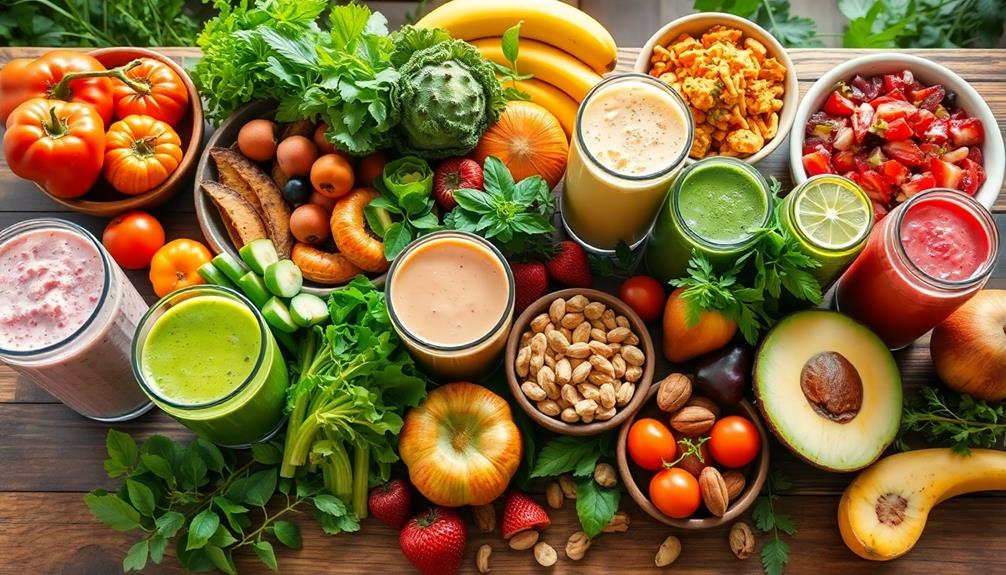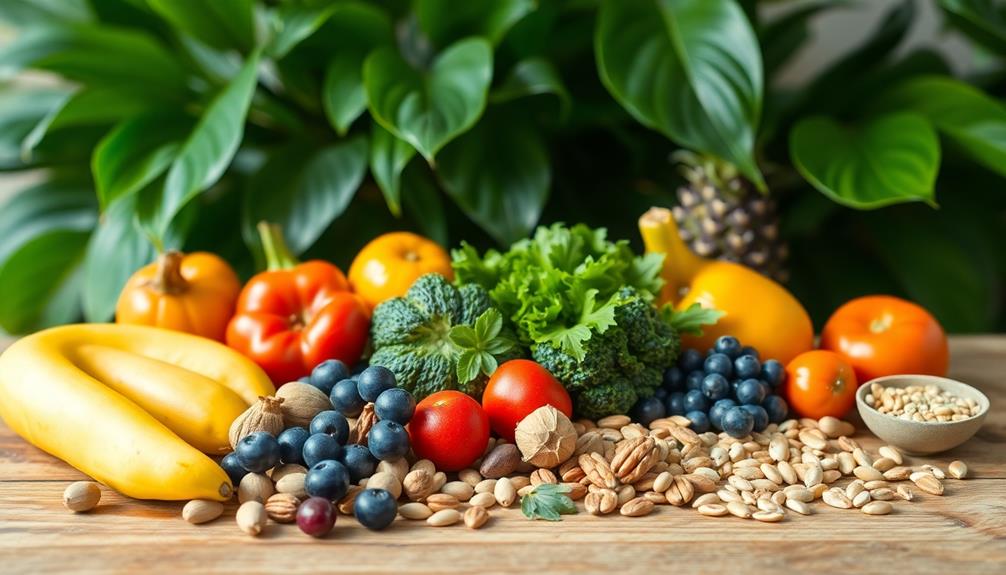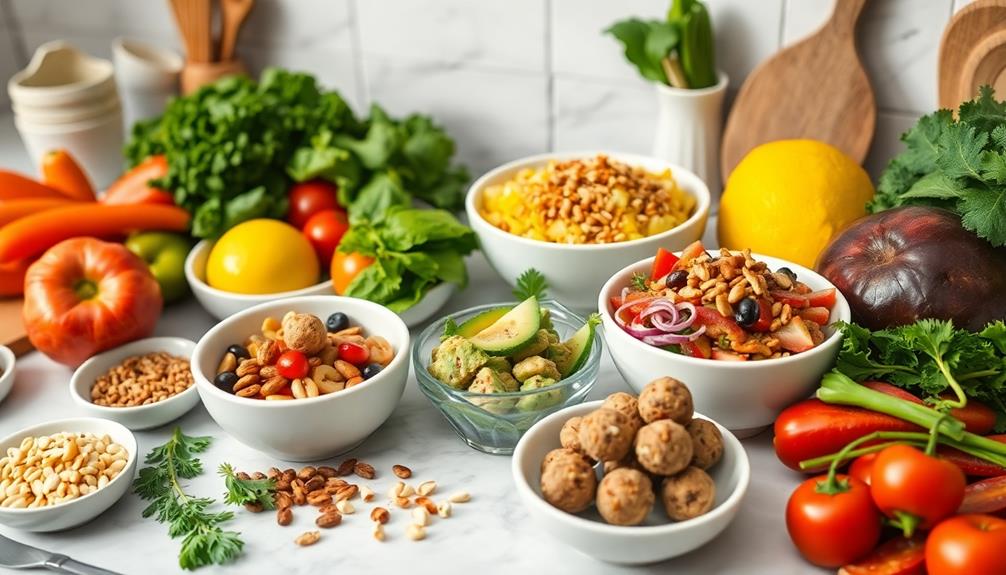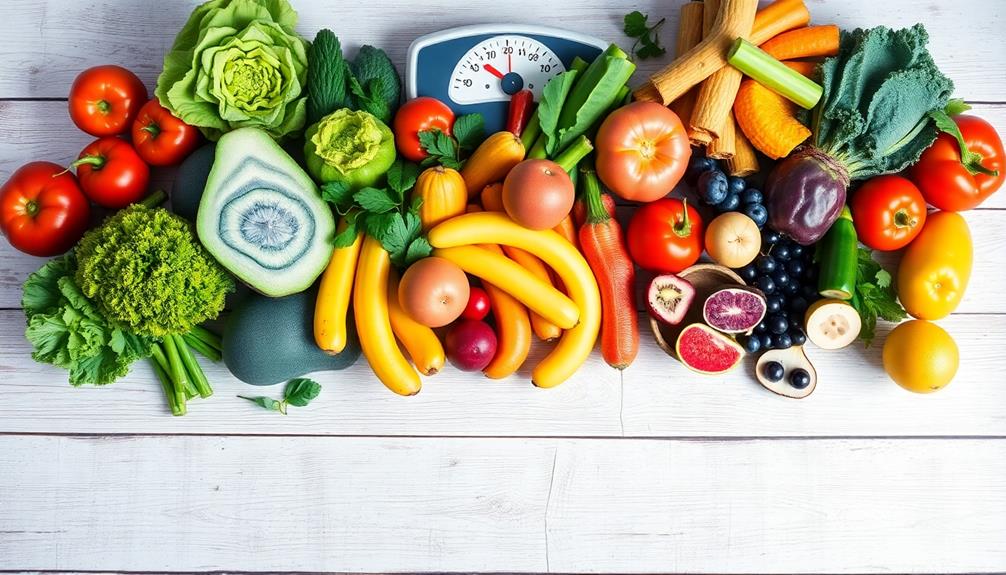When you adopt a raw food diet, you can expect significant improvements in your digestive health. The high fiber content in raw fruits and vegetables helps boost bowel regularity and supports a healthy gut microbiome. You'll likely feel fuller, which can aid in weight management as well. However, be prepared for potential digestive challenges, like bloating, especially initially. It's essential to practice food safety and guarantee you're getting all necessary nutrients. With some planning and experimentation, you'll find delicious ways to enjoy your meals. There's so much more to learn about this lifestyle, including tips for success and common pitfalls to avoid.
Key Takeaways
- The raw food diet is high in fiber, promoting regular bowel movements and enhancing overall digestive health.
- Increased intake of raw fruits and vegetables supports a diverse gut microbiome, aiding digestion and nutrient absorption.
- Live probiotics from fermented raw foods help maintain a balanced gut flora, improving digestive efficiency.
- Transitioning to a raw food diet may cause temporary digestive disturbances, including bloating and gas, especially for newcomers.
- Proper food safety practices are crucial to minimize risks of foodborne illnesses associated with raw food consumption.
Understanding the Raw Food Diet
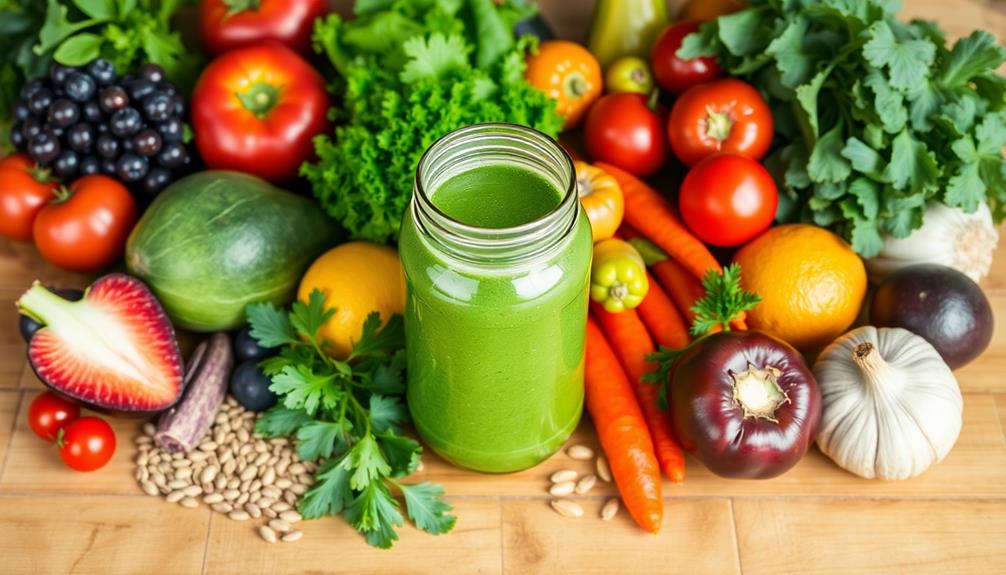
Understanding the raw food diet can transform your approach to nutrition. This diet primarily consists of uncooked foods, including fruits, vegetables, nuts, seeds, and sprouted grains. By opting for plant-based foods, you're likely to boost your intake of vitamins, minerals, and antioxidants.
Proponents argue that cooking destroys fundamental nutrients and enzymes, which can enhance digestion and overall health. The high fiber content in raw foods promotes improved digestive health, potentially reducing the risk of chronic diseases.
Additionally, feeding raw food to pets can help guarantee they receive proper nutrition, as it consists of uncooked meats and vegetables that are beneficial for their health. However, it's important to be mindful of potential nutrient deficiencies when following a raw food diet. Vitamins like B12, iron, and omega-3 fatty acids may be lacking, so careful meal planning is critical to guarantee balanced nutrition.
Moreover, preparing raw food in advance can save time and help maintain freshness. Additionally, food safety is a significant concern, as consuming raw or unpasteurized foods carries risks of foodborne illnesses. Understanding proper food handling and preparation techniques is fundamental for minimizing these risks.
Incorporating a raw food diet can be rewarding, but you must stay informed about its benefits and challenges. By doing so, you can make smarter food choices that support your health and well-being.
Key Foods You Can Enjoy
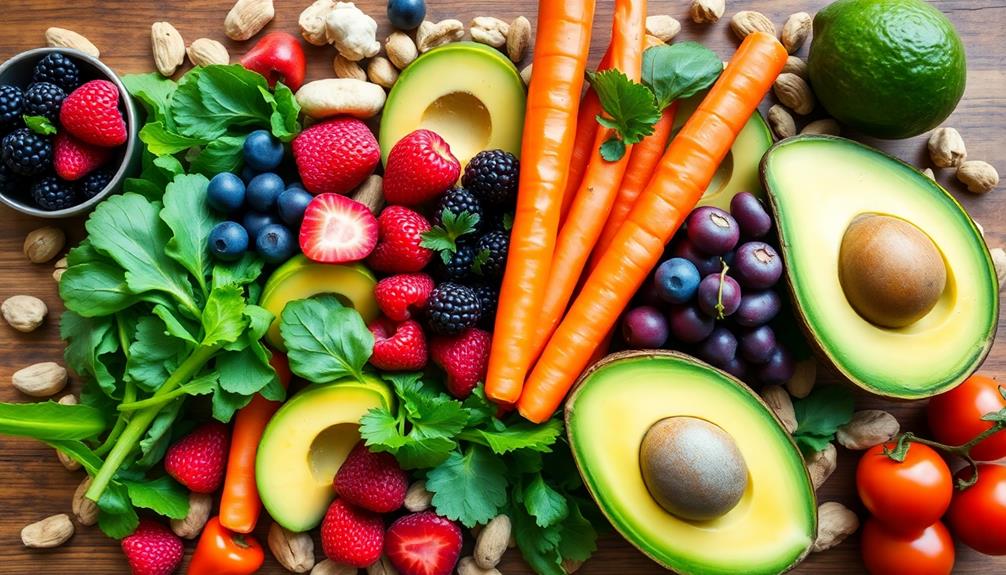
When starting on a raw food diet, you'll discover a diverse array of key foods that can enhance your meals and support digestive health. Incorporating these raw foods into your diet will provide essential nutrients, fiber, and probiotics that promote ideal digestion.
Additionally, consuming foods rich in antioxidants, such as coffee's health benefits, can further support your overall well-being while on this diet.
Here are three food categories you'll want to explore:
- Leafy Greens: Spinach, kale, and arugula are packed with fiber and essential nutrients that help maintain digestive health.
- Fruits: Berries, avocados, and bananas aren't only delicious but also provide healthy fats and soluble fiber, which can regulate digestion and prevent constipation.
- Fermented Foods: Foods like sauerkraut and kimchi are rich in probiotics, supporting a healthy gut microbiome and improving overall digestive health.
Additionally, vegetables like cucumbers, tomatoes, and carrots contain high water content, helping you stay hydrated and aiding digestion.
Effort Required for Success
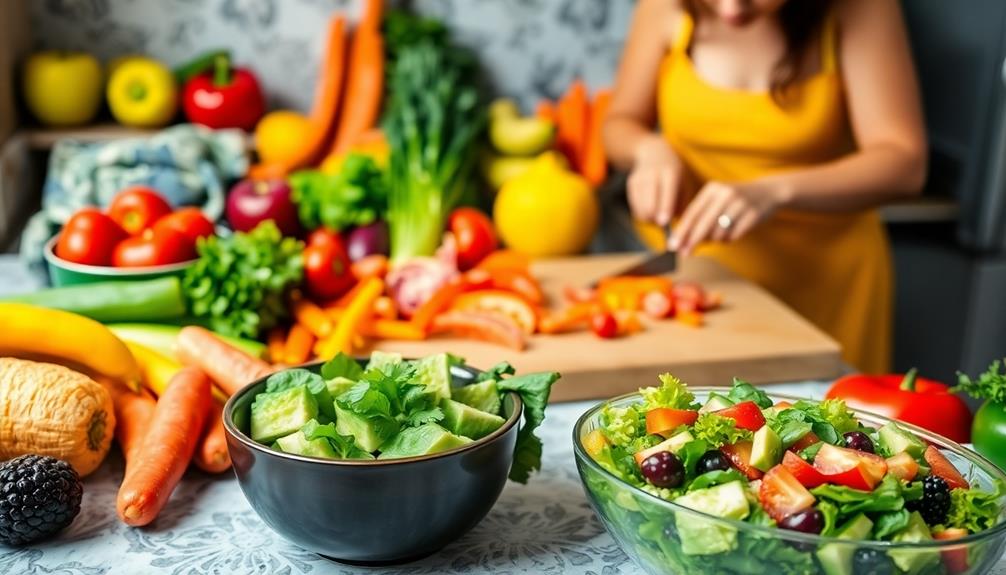
Starting on a raw food diet demands a considerable commitment to meal preparation. You'll need to invest significant effort into techniques like soaking, sprouting, and dehydrating to create balanced meals. This diet emphasizes organic foods, which often means sourcing ingredients from specialty stores, making your shopping trips less convenient compared to traditional grocery options.
Additionally, incorporating nutrient-rich foods like beetroot characteristics can enhance your meal variety and health benefits. High-quality kitchen appliances, such as blenders and food processors, are essential for efficiently preparing raw meals. These tools not only add to your initial investment but also contribute to ongoing costs. The time-intensive nature of this diet can feel overwhelming, especially when you're trying to maintain meticulous food safety practices.
Social situations can also challenge your adherence to a raw food diet. Dining out often presents limited options that align with your strict guidelines, which can lead to feelings of deprivation.
However, the health benefits you may gain from this commitment can make it worthwhile. It's vital to remain focused and organized to navigate the demands of a raw food lifestyle successfully. With the right mindset and planning, you can make this effort rewarding and enjoyable.
Health Precautions to Consider

Adopting a raw food diet brings numerous health benefits, but it also requires you to be mindful of food safety. The consumption of uncooked foods can expose you to food-borne illnesses if proper precautions aren't taken.
Here are some essential health precautions to weigh:
- Thoroughly wash your hands before handling raw fruits and vegetables to minimize contamination.
- Avoid high-risk foods such as raw meat, eggs, and shellfish, which pose significant food safety risks.
- Be cautious with toxic raw foods like cassava and certain beans, as they can lead to severe health risks, including cyanide poisoning.
It's especially important to note that vulnerable populations—children, seniors, pregnant women, and individuals with weakened immune systems—should think twice before adopting a raw food diet.
The potential health risks associated with consuming uncooked foods can pose serious threats to their well-being.
By taking these precautions, you can enjoy the benefits of a raw food diet while minimizing the chances of contamination and food-borne illness.
Stay informed and prioritize safety to make the most of your dietary choices.
Impact on Weight Loss
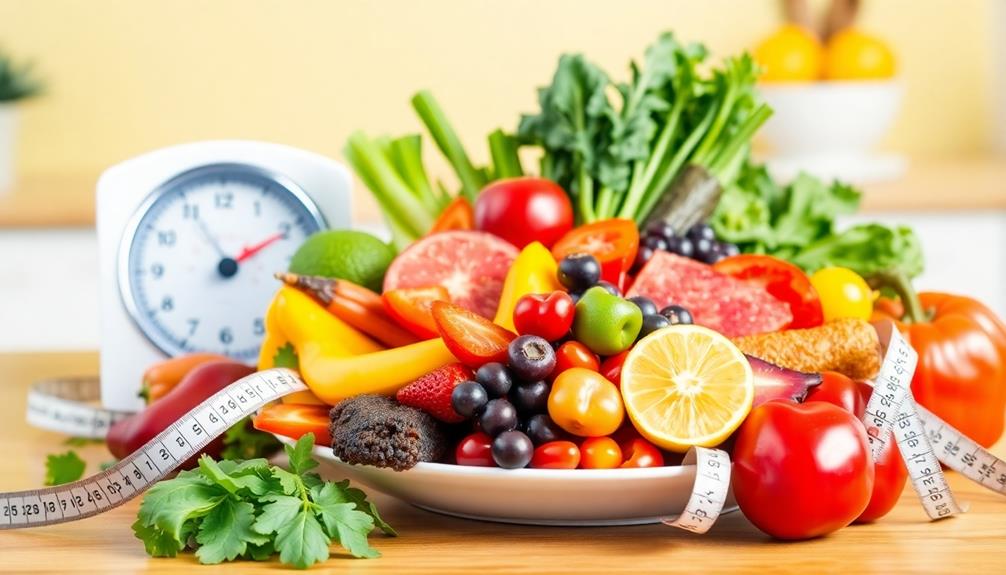
When you switch to a raw food diet, you'll notice a significant drop in caloric density, which can help you shed pounds.
The high fiber content in raw fruits and vegetables not only aids digestion but also keeps you feeling full longer, reducing your overall food intake.
As you explore this diet, you'll likely see changes in your body composition, including less body fat and a slimmer waistline.
Caloric Density Effects
The raw food diet's low caloric density plays an essential role in weight loss, allowing you to enjoy larger portions while consuming fewer calories. This means you can fill your plate with colorful fruits and vegetables, promoting feelings of fullness without overloading on calories.
The high fiber content in these raw foods not only supports digestive health but also enhances your weight loss journey.
Here are a few key benefits of low calorie density in the raw food diet:
- Sustained Fullness: Eating raw foods helps keep you satisfied, reducing the urge to snack on higher-calorie options.
- Reduced Overall Caloric Intake: With lower fat and sodium levels, you're more likely to maintain a caloric deficit necessary for weight loss.
- Significant Weight Loss: Many people on this diet report losing up to 20 pounds or more in just a few months.
Fiber's Role in Digestion
Fiber plays an essential role in your digestive health and weight loss journey, acting as a natural ally in maintaining regular bowel movements and preventing constipation.
When you incorporate raw foods, like fruits and vegetables, into your diet, you're boosting your fiber intake considerably. This high fiber content helps create a feeling of fullness, which can reduce your overall calorie intake, supporting your weight loss efforts.
Studies show that for every additional 14 grams of fiber you consume daily, you might see a 10% reduction in calorie intake. This means that choosing raw foods can make a significant difference in your weight management goals.
Furthermore, fiber is vital for maintaining gut health. It acts as a prebiotic, nourishing the beneficial bacteria in your microbiome, which is essential for peak digestive health.
Additionally, the soluble fiber found in raw foods helps regulate blood sugar levels and improves insulin sensitivity, further aiding in weight management.
Nutritional Benefits and Risks
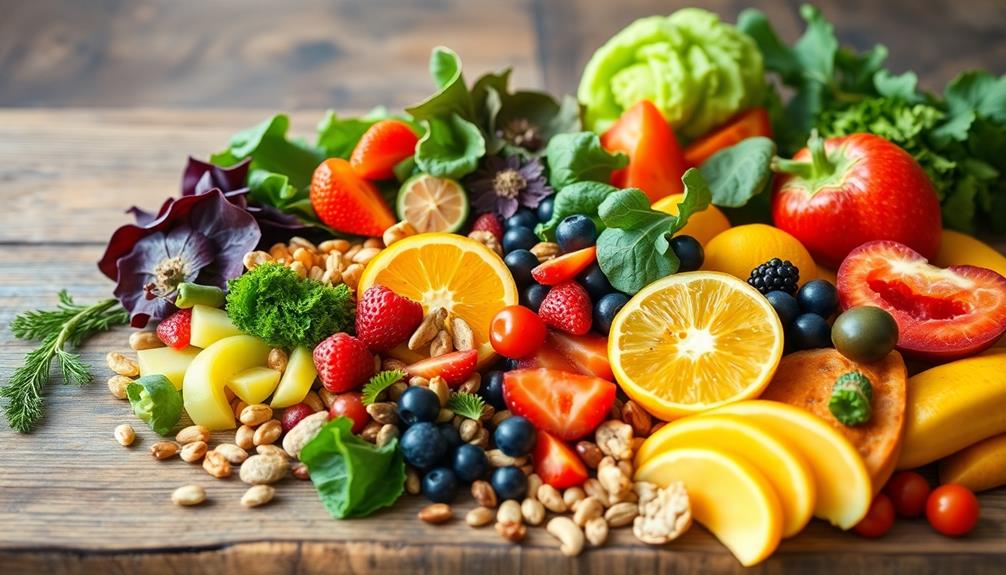
A raw food diet offers numerous nutritional benefits, primarily due to its emphasis on fresh fruits, vegetables, nuts, and seeds. These foods are rich in vitamins, minerals, and antioxidants, helping to lower the risk of chronic diseases like heart disease and diabetes. The high fiber content in raw foods promotes digestive health, improving gut motility and preventing constipation.
However, there are risks associated with this diet that you should consider:
- Nutritional deficiencies, especially in vitamin B12, iron, calcium, and omega-3 fatty acids.
- The heightened risk of foodborne illness from consuming raw meats and unpasteurized dairy.
- The need for careful meal planning and potential supplementation to avoid nutritional gaps.
While you may experience significant weight loss due to the low-calorie density of raw foods, it's important to balance these benefits with the potential downsides.
Proper food safety practices are vital to maintain your digestive health when following a raw food diet. By being aware of these factors, you can make informed choices that support your overall well-being while enjoying the advantages of this dietary approach.
Digestive Health Improvements

When you switch to a raw food diet, you're boosting your fiber intake, which helps promote regular bowel movements and overall digestive health.
You'll also benefit from the live probiotics found in raw foods, supporting a balanced gut microbiome that enhances digestion.
These changes can lead to firmer stools and improved nutrient absorption, making your digestive system more efficient.
Increased Fiber Intake
Eating a raw food diet naturally boosts your fiber intake, which plays an essential role in enhancing digestive health. A diet rich in fruits, vegetables, nuts, and seeds not only improves bowel regularity but also reduces constipation. This increased fiber consumption promotes the growth of beneficial bacteria, supporting your overall digestive function.
Here are some key benefits of increased fiber intake from a raw food diet:
- Improved bowel regularity: Regular fiber intake helps maintain consistent digestive patterns, reducing discomfort.
- Weight management: High fiber content leads to a feeling of fullness, which can prevent overeating and support healthy weight management.
- Reduced risk of digestive disorders: Studies indicate that a high-fiber diet lowers the risk of conditions like diverticulitis and colorectal cancer.
The soluble fiber found in raw foods can also help regulate blood sugar levels and lower cholesterol, further contributing to improved digestive health.
Enhanced Gut Microbiome
The benefits of a raw food diet extend to your gut microbiome, where live probiotics flourish, promoting a balanced ecosystem that's essential for ideal digestive health. By incorporating raw foods into your diet, you enhance the diversity of gut bacteria, which plays a significant role in strengthening your immune function.
The high fiber content from fruits and vegetables not only aids in regular bowel movements but also improves overall gut motility, reducing the risk of constipation.
Moreover, the moisture retention in raw foods supports digestion and nutrient absorption, helping your liver and kidneys flush out toxins effectively. As you consume more raw foods, you'll likely notice a reduction in harmful bacteria in your gut, which can help combat issues like yeast infections and diarrhea.
This shift toward a healthier gut microbiome means you're not just improving your digestive health but also boosting your overall well-being.
In essence, adopting a raw food diet can create a thriving environment for beneficial probiotics, leading to enhanced digestive health and a more resilient immune system. It's a powerful way to nurture your body from the inside out.
Common Challenges Faced
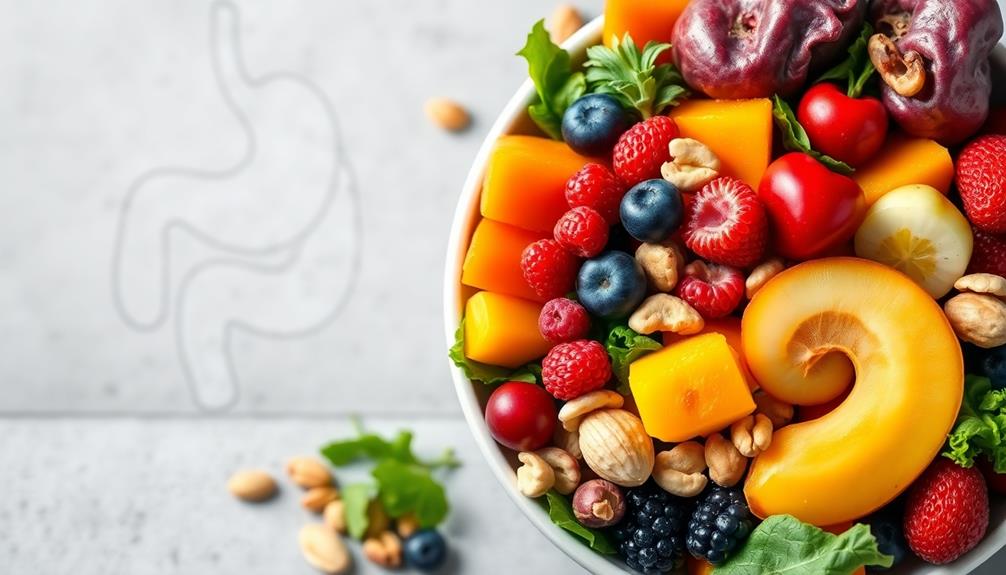
Steering through a raw food diet can present several common challenges that impact digestive health. Many people find that the high fiber content in raw fruits and vegetables can lead to digestive challenges, including bloating and gas.
Additionally, since raw foods aren't cooked, digestibility may decrease, making nutrient absorption more difficult for some. As you shift, you might experience temporary digestive disturbances due to the sudden increase in raw plant intake.
It's also essential to balance your fiber intake with adequate hydration; otherwise, you could face irregular bowel movements or even constipation.
Here are some key challenges to keep in mind:
- High Fiber Content: Can lead to bloating and gas for those unaccustomed to it.
- Foodborne Illnesses: Consuming raw foods, especially sprouts and unpasteurized products, increases your risk of gastrointestinal distress if food safety practices aren't strictly followed.
- Hydration Needs: Insufficient hydration can exacerbate digestive issues, particularly when increasing fiber intake.
Being aware of these challenges can help you better prepare for the ups and downs of your raw food journey.
Practical Tips for Beginners
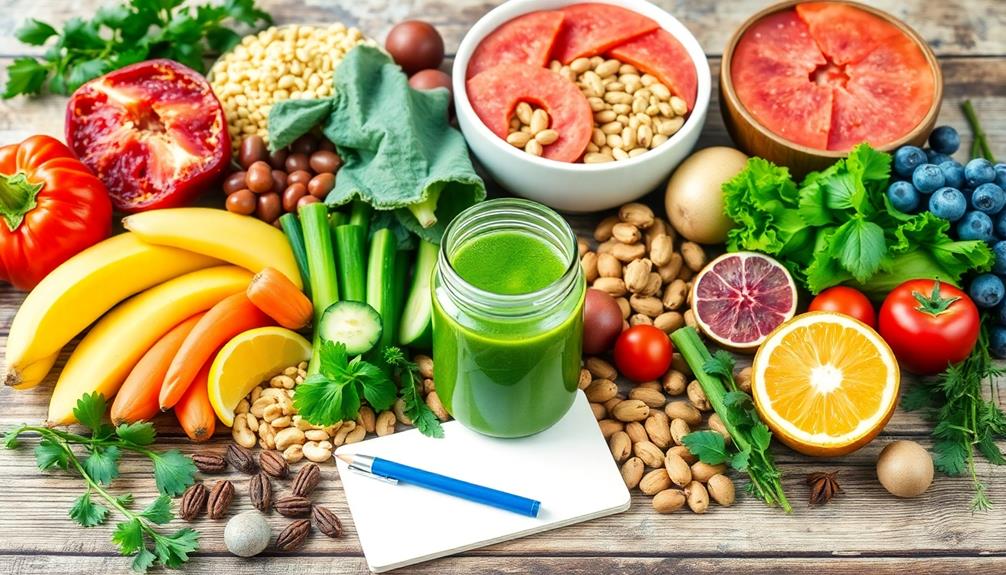
Maneuvering a raw food diet can initially seem intimidating, especially with the digestive challenges that may arise. Start simple by trying easy raw food recipes like smoothies or salads. This helps you ease into eating raw foods without overwhelming yourself with complex food preparation.
Investing in quality kitchen appliances, such as high-speed blenders and food processors, will make preparing a variety of raw meals efficient and enjoyable.
Focus on seasonal produce to guarantee you're getting the freshest ingredients, which enhances both flavor and health benefits. Don't hesitate to experiment with sprouting and fermenting foods; these methods can elevate the taste and nutritional value of your meals.
Joining online communities or local support groups can provide you with a wealth of resources. Sharing recipes and tips with others on similar journeys can offer motivation and keep you committed to your raw food diet.
Long-term Sustainability Factors

Sustaining a raw food diet over the long term requires careful consideration and planning. While you may experience benefits initially, several factors can challenge the long-term sustainability of this lifestyle.
- Nutritional deficiencies: Long-term adherence can lead to deficiencies in critical nutrients like vitamin B12, iron, and protein, making meal planning and potential supplementation essential.
- Time-intensive food preparation: The daily commitment to preparing raw meals can become overwhelming, increasing the likelihood of reverting to convenient but less healthy options.
- High costs: The expense of organic produce and specialized kitchen tools can strain your budget, complicating your ability to maintain this diet over time.
Additionally, you might face limited food options, making social events difficult and potentially leading to feelings of isolation.
Research also indicates that strict adherence can result in digestive issues and irregularities in menstrual cycles for women.
Frequently Asked Questions
What Happens to Your Body When You Eat Raw Food?
When you eat raw food, your body absorbs more nutrients, boosts hydration, and improves digestion. You'll likely experience increased energy, better gut health, and enhanced nutrient absorption, all while enjoying the natural flavors of fresh produce.
What to Expect When Switching to Raw Diet?
When switching to a raw diet, you'll notice changes like increased energy, improved digestion, and potential cravings for cooked foods. Embrace the discomfort, adapt gradually, and enjoy the benefits of vibrant, nutrient-rich meals.
What Are the Side Effects of the Raw Food Diet?
When you adopt a raw food diet, you might experience bloating, gas, and diarrhea. You could face nutrient deficiencies and increased risks of foodborne illnesses, impacting your overall health and well-being over time.
What Happens When You Only Eat Raw Food?
When you only eat raw food, you might experience enhanced digestion and energy, yet risk nutrient deficiencies. Your body adjusts to increased fiber, which can lead to discomfort while promoting gut health and regularity simultaneously.
Conclusion
Embracing a raw food diet can transform your digestive health, boost your energy, and enhance your overall well-being. By enjoying vibrant fruits and veggies, committing to mindful eating, and staying informed about potential challenges, you'll set yourself up for success. Remember, it's about finding balance, staying adaptable, and listening to your body. Whether you seek weight loss, better digestion, or a fresh culinary adventure, the raw food journey offers a vibrant path to health and liveliness.

